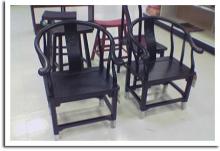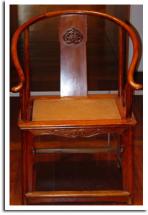Every time I visit China, I always see Western families in the hotel lobby with their Chinese adopted children in tow. If you ever wonder what exactly become of them, how they are doing, and what struggles and challenges they face, here’s an interesting essay I found by Elizabeth Holmes, a Chinese adoptee, who won second prize in the Celebrate Diversity! Essay Contest. Read Elizabeth Holmes’ Essay on Culture, Identity and Heritage.
Category: Culture
-
Ancient Chinese Bar Stools
 As if seeing Chinese furniture at Target wasn’t enough, i head to Costco and find the same. However, they were passing these off as bar stools. I’m sure that’s not what these types of chairs are called in China though. Where next? Crate and Barrel?
As if seeing Chinese furniture at Target wasn’t enough, i head to Costco and find the same. However, they were passing these off as bar stools. I’m sure that’s not what these types of chairs are called in China though. Where next? Crate and Barrel? -
Antique Chinese Chairs
 So, how do these chairs compare with the museum-quality one. Good from afar, but far from good? I couldn’t quite decipher the symbol carved on the back of the chair. Definitely did not appear to be anything I’ve seen before on any antique Chinese furniture. Oh, I found those chairs at Target. I also saw terracotta soldier replicas as well.
So, how do these chairs compare with the museum-quality one. Good from afar, but far from good? I couldn’t quite decipher the symbol carved on the back of the chair. Definitely did not appear to be anything I’ve seen before on any antique Chinese furniture. Oh, I found those chairs at Target. I also saw terracotta soldier replicas as well. -
Antique Chinese Furniture
 I love antique Chinese furniture. A great place to view antique Chinese furniture is along Hollywood Road in Hong Kong, which is packed with shops selling furniture, jades, fossils and other assorted antiques. Recently, I came across a couple stores in the United States selling “Chinese” furniture. I was surprised, as you will be, when I tell you where I came across a piece of Chinese heritage.
I love antique Chinese furniture. A great place to view antique Chinese furniture is along Hollywood Road in Hong Kong, which is packed with shops selling furniture, jades, fossils and other assorted antiques. Recently, I came across a couple stores in the United States selling “Chinese” furniture. I was surprised, as you will be, when I tell you where I came across a piece of Chinese heritage. -
Top 8 Reasons to Learn English
The United States requires applicants for naturalization to be able to read, write, speak, and understand English. However, the U.S. exempts older applicants who have resided in the United States as a lawful permanent resident for a long duration or those with a medical impairment that affects their ability to learn English. While green card holders that qualify for one of the above exceptions do not have to learn English to become a U.S. citizen, they should not view the exception as an excuse not to learn English. Being a U.S. citizen and being able to fully partake in the benefits of American society are two separate issues. The advantages of being able to communicate in English are numerous:
- America the Beautiful. You need to learn English if you want to travel outside of Chinatown. Though, many Chinese old timers may sniff at America the Beautiful. China has more history. The Grand Canyon can’t even compare to Guilin. They’ll even tell you all the great things about living in China while their two feet are firmly planted in U.S. soil. Learn English. Be adventurous. Visit the national parks and soak in the grandeur of America.
- Cold Hard Cash. Sure, there are jobs available to those who can only speak Chinese. So, technically, you don’t even have to speak English to find a job in America. But, why limit yourself to only seeking Chinese-speaking jobs? A little investment in education, pays dividends.
- Good Health, Long Life. Even when you visit your Chinese-speaking doctor, the prescription will be written in English. Learning English lets you understand what medicine was prescribed. You need to understand the proper dosage and side effects of all medicines you take.
- Law and Order. If you ever get into an accident or are a victim of a crime, you need to be able to communicate clearly with the police or fire department. Sure, some departments may have Chinese-speaking interpreters available. But, the unavailability of an interpreter during a critical situation could jeopardize of you or a loved one.
- Education. Education is a bedrock of the Chinese culture. To properly communicate with your children’s teachers, you need to understand English.
- Descendents. Your children were dutiful enough to continue your family line. But, these young rascals speak English! If your grandchildren grow up in the United States, they will face a challenging time holding onto their Chinese language. If you wish to communicate with them, teach them Chinese but also learn English on your own so you can meet them half way.
- Chinatown Has Moved. The Chinese American population has dispersed all across America. Life in the suburbs means all the stores and services usually are not within walking distance anymore. The further you have to travel, the more likely you will need English to read road signs or interact with others. Oh. Make that another reasons to complain about the United States. Back in China, I can just go downstairs and…
- Learning for Learning’s Sake. Sometimes, you shouldn’t need a reason to learn something. As a human being, you are blessed with a brain that is designed to learn new skills. If you start refusing to learn new skills just because there’s no reason to, well, then America probably isn’t the place for you.
-
Google Patent Search Gives Glimpse Into U.S. Racist History
 This week, Google launched Google Patent Search, which lets you search the entire collection of patents made available by the USPTO. As of the launch date, Google Patent Search covered patents issued from the 1790s to the middle of 2006. Now, this is not the first patent search engine, so let’s take a look and compare them.
This week, Google launched Google Patent Search, which lets you search the entire collection of patents made available by the USPTO. As of the launch date, Google Patent Search covered patents issued from the 1790s to the middle of 2006. Now, this is not the first patent search engine, so let’s take a look and compare them.I ran a search for “chinaman” on the USPTO website (4 matches), on the Patent Storm web site (3 matches) and on the Google Patent Search website (17 matches).
Aside from the fact that Google found more matches than these other two services, I was also surprised that there were any matches at all. Now, you may be curious to see what types of patents will invoke the term “chinaman.” After all, when we think about patents and intellectual property, our minds naturally gravitate towards cutting edge inventions and not racial slurs.
But, sure enough, Patent Number D12733 for a Design for a Toy for Exploding Caps and Fulminates shows a “Chinaman walking or running along the said barrel-like portion of the hand-piece” and an Irishman with a leg acting as the hammer “which operates with a kicking movement.” The inventor also asserted, “My design . . . makes the toy a source of great amusement to children using it.” On the handle of the toy gun are the words: “The Chinese Must Go.” Presumably, this won’t be a great source of amusement to Chinese children.
-
Better to Be Good, Than Authentic
Los Angeles Times: California Rolls Drive Them to Distraction. Ever wonder whether the negi toro you ordered at that sushi place on Wilshire was the real deal? Well, the Japanese government does. Officials in Tokyo, concerned that diners around the globe are getting a less-than-genuine taste of their nation’s cuisine, are devising a sort of bureaucratic Zagat guide that will confer a stamp of authenticity on restaurants that meet the government’s standards.
Some bureaucrats with too much time on their hands? Actually, I’m a bit jealous. Some government worker will probably get to travel the world on the taxpayer’s dime trying out different restaurants. However, the true test of a restaurant isn’t whether it is authentic or not, but whether the food appeals enough to their clientele’s tastes. That’s why you won’t find “authentic” Chinese restaurants in some parts of America. If the customers want sweet and sour pork instead of braised chicken feet, you prepare the dishes that pays the bills. It’s that simple.
As much as I like “authentic” Chinese food, I’ll take orange chicken any day from Panda Express over stinky tofu at your local Chinese diner.
-
Chinese School
Not too long ago, selecting a Chinese school that was appropriate for your child was much simpler. You sent them to the school closest to your home. Now, with the growing influx of Chinese immigrants, some parents may find several different schools in their neighborhood to choose from. Here are some important factors to consider when selecting a school:
- Dialect. Most schools offer instruction in either Mandarin or Cantonese, with some schools offering instruction in both. If you speak Mandarin at home, you will be more readily able to assist and reinforce your child’s language lessons if they were also learning Mandarin. The same is true if you speak Cantonese and your child is attending Cantonese classes. Cantonese is spoken in Hong Kong and Guangdong (Canton), while Mandarin is spoken in the People’s Republic of China and Taiwan.
- Phonetics. Mandarin is usually taught in either Pinyin (拼音) or Zhuyin (注音符號), which is also known as BoPoMoFo (ㄅㄆㄇㄈ). These two systems of Chinese phonetics associate a particular sound with a symbol. For example, the b sound in Mandarin is represented by a “b” in Pinyin and a “ㄅ” in Zhuyin. Pinyin is the current system of romanization used in the People’s Republic of China, and is also the standard used by the United States as well as the United Nations.
- Characters. Chinese characters may either be written in the simplified style (简体) or the traditional style (繁体). The simplified style is used in the People’s Republic of China, while the traditional style is used in Hong Kong and Taiwan.
- SAT II – Chinese. Some Chinese schools offer specific preparation for the SAT II – Chinese with Listening examination. This high school-level examination tests reading and listening comprehension, as well as sentence completion. The listening portions are spoken in Mandarin Chinese, while the reading passages are in both traditional and simplifed Chinese. The sentence completion portion is administered in traditional and simplified Chinese, as well as Pinyin and BoPoMoFo.
More Resources
California
- Berryessa Chinese School Provides Cantonese and Mandarin language classes in North San Jose (Berryessa), CA.
- International School of the Peninsula A Chinese language immersion day school in Palo Alto, CA.
- Los Angeles Chinese Learning Center Provides Chinese language classes in Los Angeles and Orange County.
- New Concept Chinese School Provides Mandarin classes in Fremont and San Jose, CA.
- Santa Barbara Chinese School Provides Chinese language classes in Santa Barbara, CA.
- Thousand Oaks Chinese School Provides Chinese language classes in Thousand Oaks, CA.
- Yellow River Chinese School Provides Mandarin classes in Fremont, CA.
Colorado
- Bohua Chinese School Provides Chinese language classes in Boulder, CO.
Connecticut
- Chinese Language School of Connecticut Provides Mandarin classes in Riverside, CT.
Maryland
- Hope Chinese School Provides Chinese language classes in Bethesda, College Park, Fairfax, Germantown and Rockville, MD as well as Herndon, VA.
- Potomac Chinese School Provides Chinese language classes in Potomac, MD.
Michigan
- American Chinese School of Greater Detroit
- Ann Hua Chinese School Provides Chinse language classes in Ann Arbor, MI.
- Canton Chinese School Provides Chinese language classes in Plymouth, MI.
- Grand Rapids Chinese Language School Provides Chinese language classes in Grand Rapids, MI.
- Michigan New Century Chinese School Provides Chinese language classes in Livonia, MI.
- Southern Michigan Chinese School Provides Mandarin classes in Troy, MI.
New Jersey
- Chinese Heritage School of New Jersey Teaches Cantonese and traditional Chinese written characters in Monmouth Junction, NJ.
- EverBright Chinese School Provides Chinese language classes in Edison, NJ.
- Huaxia Chinese School Provides Chinese language classes in Bloomfield, Hillsboro, Fort Lee, Boonton, Marlboro, Edison and Plainsboro, NJ.
- YingHua Language School Provides Mandarin classes in Lawrenceville, NJ.
New York
- Albany Chinese School Provides Chinese language classes in Latham, NY.
- Chinese Institute Provides Mandarin and Cantonese classes in New York, NY.
- Chinese School of Southern Westchester Provides Mandarin classes in Scarsdale, NY.
- Dix Hills Chinese Cultural Association Provides Chinese language classes in Dix Hills, NY.
- Huaxia Chinese School Provides Chinese language classes in Wappingers Falls and Westchester, NY.
- Nortnern Westchester Chinese School Provides Chinese language classes in Somers, NY.
- Sunflower Chinese Language Studio. Teaches Mandarin to children between 3-6 years of age in Ossining, NY.
Oregon
- Jiao Ying Chinese Culture & Art School Provides Mandarin classes in Portland, OR.
- Springleaf Chinese School Provides Chinese classes in Portland, OR.
Pennsylvania
- Huaxia Chinese School Provides Chinese language classes in Bethlehem, PA.
Texas
- Austin Great Wall Chinese School Provides Chinese language classes in Austin, TX.
- Bodhi Chinese School Provides Chinese language classes in Houston, TX.
Virginia
- Hope Chinese School Provides Chinese language classes in Bethesda, College Park, Fairfax, Germantown and Rockville, MD as well as Herndon, VA.
- Tidewater Chinese School Provides Chinese language classes in Norfolk, VA.
Washington
- Northwest Chinese School Provides Mandarin classes using simplified Chinese and pinyin in Kirkland and Seattle, WA.
- Sammamish Chinese Academy Provides Mandarin classes in Sammamish, WA.
Washington DC
- Hope Chinese School Provides Chinese language classes in Bethesda, College Park, Fairfax, Germantown and Rockville, MD as well as Herndon, VA.
Canada
- Chinese Cultural Centre of Greater Vancouver Provides Mandarin and Cantonese language classes in Vancouver, Burnaby and Coquitlam.
Associations
- Association of Northern California Chinese Schools Provides a directory of member schools in Northern California.
- Chinese School Association in the United States Provides a directory of member schools in the United States.
- Southern California Council of Chinese Schools Provides a directory of member schools in Southern California.
Note: All updates will be made to this Chinese School page.